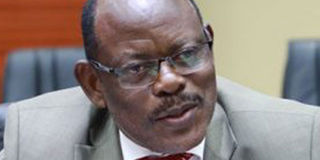Nawangwe named head of global universities network

Barnabas Nawangwe, Makerere University vice chancellor. PHOTO | FILE
What you need to know:
- The ranking places Makerere together with Mansoura University in Egypt, the University of Ibadan, Nigeria, and Durban University of Technology in South Africa, among others in the same position.
- The rankings included more than 1,500 universities across 93 countries and regions.
Makerere University Vice Chancellor Prof Barnabas Nawangwe was yesterday in celebratory mood following his appointment as the director of the Worldwide Universities Network based in the UK.
Prof Nawangwe yesterday told Daily Monitor in a telephone interview that his appointment is a very important recognition for Makerere as one of the top research universities in the world.
He said this will spur research at Makerere and elevate the university’s standards worldwide.
“Makerere has finally got the recognition internationally as a top research university and the recognition brings a lot of benefits, including recognition by grant-giving organisations,” Prof Nawangwe said.
He also revealed that this means that Makerere will have higher chances of getting grants when competing with other universities “because the grant-giving organisations would want to put their money where there will be results.”
“The appointment is also the recognition of the research that comes out of the university. It is not only the volume but also the quality. It shows that we are doing top niche research at the international level and of course, it brings a lot of benefits to the university. We can now easily collaborate with other top research universities which did not see it was necessary to collaborate with us,” Prof Nawangwe said.
World University Network is a higher education and research network made up of 22 top universities in 12 countries on six continents, which drives research collaboration and addresses issues of global significance.
Makerere, University of Ghana and University of Cape Town are the only three African universities on the list.
Prof Nawangwe becomes the first black to be appointed as director of the network. He said this is a great achievement in his career, and an indication that he is a good leader.
“To me, it is a recognition of my contribution to transforming the university and I am excited about this appointment and I believe it will lead to growth of the university in research,” he said.
“Members of the board take decisions. The network also applies for funding from organisations and the money is given to members, so it is an achievement that will be among the top leaders to take these,” Prof Nawangwe added.
The appointment comes barely two months after Makerere was voted among the top five universities in Africa and top 401-500 universities globally.
The appointment also comes at a time when the university Main Building caught fire, destroying various offices and documents.
The university is currently fundraising to renovate the building before celebrating its 100 years in existence in 2022.
In September, Makerere University was ranked Africa’s fifth best university and the best in East Africa, according to the latest World University rankings by Times Higher Education.
The ranking places Makerere together with Mansoura University in Egypt, the University of Ibadan, Nigeria, and Durban University of Technology in South Africa, among others in the same position.
The rankings included more than 1,500 universities across 93 countries and regions.
BENEFITS
Information on the WUN website indicates that throughout the year, the network hosts conferences, workshops, seminars and events that bring an international community of researchers together to share ideas, spark and collaboration.
The network also provides seed funding to support bright researchers with great ideas to develop their concepts and form international research teams that can subsequently seek long-term funding from external funding agencies. Many WUN collaborations include activities that produce resources for use in teaching or which provide early stage researchers with opportunities to develop presentation skills.



